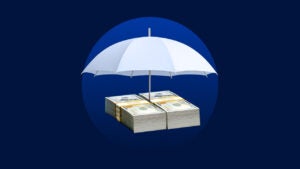What happens if you default on a personal loan — and how do you prevent it?

Key takeaways
- A personal loan is in default if your payments are 30 to 90 days late, depending on your loan agreement.
- Reaching out to your lender early can help you avoid serious damage to your credit score and even legal action.
- Debt consolidation and working with a credit counselor can be helpful strategies for managing loan default.
- There are steps you can take to avoid defaulting on a personal loan.
Defaulting on a personal loan — failing to pay what you owe as promised — can have immediate and long-term consequences on your financial future. Your credit score will drop, lenders may not approve you for new credit and you could face court action. You can take several steps to avoid default or dig out of it if you’ve already gotten behind on payments.
When is a loan in default?
A loan is in default when your payment is more than 30 to 90 days late, though the number of days depends on your loan and lender. Before that time, a loan is considered a delinquent account — meaning you’ve failed to make the required payment by the due date.
Delinquency is the stage where a lender is giving you a warning that you are running behind, but you still have an opportunity to catch up. Defaulting typically means you are at a point of no return and should expect to see [serious] consequences.— Lawrence D. Sprung, CFP, wealth advisor and founder of Mitlin Financial
The current delinquency rate (60 days or more past due) for unsecured personal loans is 3.49 percent, according to TransUnion’s Q1 2025 Credit Industry Insights Report. Over the past two years, the delinquency rate has been trending downward from 3.91 percent in Q1 of 2023.
What happens if you default on a personal loan?
You are still legally obligated to pay the debt. Lenders often sell debt in default to debt collection agencies that will try to recover payment from you. By law, they must follow the Fair Debt Collection Practices Act, which limits how and when they communicate with you.
This is what typically happens when you default on a personal loan:
0 to 30 days
- Your lender will contact you: You may receive written notices or phone calls. A lender can legally contact you between 8 a.m. and 9 p.m. your time, seven days a week, including holidays and weekends — unless you make them aware of inconvenient times. They cannot, at any time, harass or abuse any person in connection with the collection.
30 to 90 days
- The lender will report late payments to credit bureaus: Late payments decrease your score and remain on your credit report for up to seven years.
- Late fees begin accumulating. This fee varies but usually ranges from $25 to $50 or 3 to 5 percent of the amount due.
90 to 180 days
- Your account could be sold to collections: When you’re 90 to 180 days late, the lender can charge off your debt. The lender assumes you won’t pay and may sell the account to a collection agency. The collection agency may set up a payment plan or offer to settle the account for less than you owe.
- Creditors could take legal action: Depending on the type of loan and your state’s laws, what happens when you default on a loan could include debt collection, asset seizure, wage garnishment and a lawsuit.
Consequences of defaulting on a personal loan
The consequences can be long-lasting and may vary depending on how many payments you missed. In most cases, you can expect the following:
- Your credit score will drop: Because payment history affects your credit score in such a big way, a default could cause a major drop.
- You may have limited credit access: Some lenders may deny future credit applications and you may be approved for much smaller loan amounts.
- You may pay higher interest rates in the future: A significant drop in your credit score means you won’t qualify for the best interest rates when applying for other credit products.
Defaulting on a secured personal loan
When you default on a secured loan, a lender can take any collateral you used to qualify for the loan. For example, say you take out a loan and use a savings account as collateral. In that case, if you default, the lender can seize your savings account to satisfy the debt.
What to do if you’re at risk of default
If you don’t think you can continue making payments on your personal loan, it’s critical to act fast. Inform your lender and seek an alternative to default.
Look at your financial situation
Begin by clearly understanding your financial situation and figure out why you can’t make your loan payments. You may want to check your budget, compare current services and look into extra income opportunities.
- Look at the nonessential spending in your budget and see where you can make changes. Consider preparing more meals at home and canceling any subscription services you rarely use.
- Compare rates for services like your home internet, auto insurance and home or renter’s insurance to see if you can get a better deal with another provider.
- Consider a part-time side hustle to add extra monthly income. Even an extra $50 per week could help you avoid missing a personal loan payment.
Reach out to your lender
Be proactive and contact your lender to discuss your situation before you miss a payment. Whether you’re experiencing a temporary issue like an unexpected car repair or expense that’s depleted your savings, or a longer-term issue, like a job loss, let the lender know. They may offer flexible payment options if they know you still want to repay the debt.
Having a relationship with your lender as you enter this difficult time can assist you in gaining cooperation from the lender, as they will see you as someone who is looking to do the right things, but you are just having a difficult time.— Lawrence D. Sprung, CFP, wealth advisor and founder of Mitlin Financial
Personal loan companies that provide hardship programs include:
- Upstart: Hardship assistance for borrowers experiencing financial difficulties.
- Upgrade: Reduced payments for a set period through its Short-Term Hardship program.
- OneMain Financial: Works with borrowers dealing with financial hardships but doesn’t list specifics on its website. Borrowers must contact OneMain Financial to work out a plan.
Ask about loan modifications
A loan modification allows you to set new repayment terms for your loan. Lenders may allow you to pause payments, spread them out over a longer time period or add missed payments to your loan balance to pay later.
Although these options may increase the total cost of your loan, loan modifications can give you much-needed, near-term relief.
Research debt consolidation
If you’re having difficulty making high-interest debt payments, you should look into a debt consolidation loan. The average personal loan interest rate is often lower than the average credit card rate, and having one payment and interest rate could give you enough room in your budget to avoid defaulting.
Find a debt counselor
If you don’t know where to start, meeting with a credit counselor may help you focus on what to do next. Look for one working for an accredited nonprofit. They can guide you by reviewing your budget and discussing different options based on their expertise.
They may help you renegotiate a plan with your lender, create a debt management plan you can afford or give you strategies to improve your credit after you default.
Look into debt relief
A debt relief company may be another option for finding lower payments. These companies work with your creditors to develop a more affordable payment plan and charge a fee once the plan is approved.
However, debt relief companies typically require you to stop making payments on your debts so lenders will be more willing to work with them. This may further damage your credit score. If you don’t want to work with a company, you can attempt to negotiate with your creditors yourself.
Contact a lawyer
Creditors and debt collection agencies can sue you for unpaid debt in default. It’s important to respond promptly if you are served a lawsuit to avoid a default judgment — that’s when a judge automatically rules in favor of the debt collector. Ignoring or refusing to accept delivery of court paperwork can lead to a default judgment.
A ruling in favor of your creditors gives them new ways to collect from you. Depending on your state, you may lose the right to dispute the debt, and debt collectors may be able to garnish your wages, freeze your bank accounts or place a lien on your property.
While you can appear in court on your own behalf, consulting a lawyer is the best option. Lawyers can advise you on your rights and may negotiate a repayment plan for your debt. If you’re worried about paying, try searching for local legal aid offices offering free or reduced-rate services. Service members can also consult their local Judge Advocate General’s office.
Be proactive to avoid personal loan default
To avoid finding yourself in a situation where you’re at risk of defaulting on a personal loan, consider the following strategies.
Decide whether a personal loan is right for you
Before you take out a loan, look honestly at your income, monthly debts and spending habits. A personal loan might not be the best choice if your income varies due to tips, commissions or self-employment. If you are living paycheck to paycheck already, you may want to hold off until you can comfortably afford the additional payment.
Personal loans aren’t the right solution for every situation. A credit card or line of credit might be better if you don’t need all your funds at once or need the flexibility to make minimum payments when your income is low. On the other hand, credit cards often have higher interest rates — and unlike a personal loan’s fixed rate, your card’s rate could go up. Weigh personal loans’ pros and cons to determine if a personal loan is your best borrowing option.
Choose appropriate loan terms
Make sure you fully understand the loan terms, including the interest rate, monthly payment and repayment period. Use a personal loan calculator to see how changing each factor would impact your budget.
Set up automatic payments
Life can get hectic, and bills can be overlooked. Enrolling in autopay is one of the best ways to pay a personal loan because it ensures you never miss a payment due to forgetfulness. You may even get an interest rate discount when setting up autopay. Ensure you have sufficient funds in your account on the due date to avoid overdraft fees.
Bottom line
Defaulting on a loan can harm your finances for years to come. Review your budget before applying for a loan or any type of debt to ensure you can afford your payments.
You always have options if you’re on the verge of defaulting on a loan or have already missed payments. The sooner and more frequently you communicate with your lender, the more likely you are to avoid severe loan default consequences.
Why we ask for feedback Your feedback helps us improve our content and services. It takes less than a minute to complete.
Your responses are anonymous and will only be used for improving our website.









